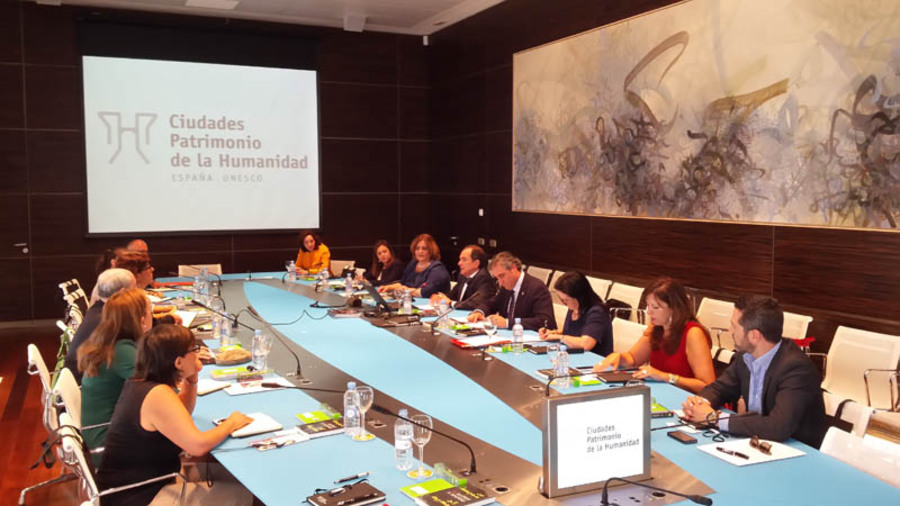Meeting of Spain’s World Heritage Cities
Casa Árabe is hosting this meeting by the network’s new Education and
Culture Commission, presided over by the Mayor of Cuenca, Ángel
Mariscal.
September 25, 2015
MADRID
The meeting was presided over by Ángel Mariscal, the Mayor of Cuenca and President of the Commission since July 18. It included attendance by the city council members for Education and Culture from the cities which are members of this network, which includes the fifteen municipalities included on UNESCO’s World Heritage Site list.
The General Director of Casa Árabe, Pedro Villena, received and welcomed the representatives from the fifteen cities. Cordoba, a member of the Heritage Cities Group, forms part of the Casa Árabe consortium, along with the Spanish Ministry of Foreign Affairs, the Autonomous Regional Government of Andalusia, the Autonomous Region of Madrid and the Municipal Government of Madrid.
During the first part of the Commission meeting, the council members from Cuenca and Baeza were named coordinators of the projects of the ESET, the network’s governing body. After this, a review of the different programs which this Commission is carrying out in the fields of education and culture was performed, always relating the wealth of the heritage sites in the network’s cities to the large number of educational and musical activities, exhibitions and contests organized by each area.
Last of all, the foundations were set for the projects to be carried out in 2015-2016, which include:
Education Area
The objective of the third edition of the Heritage Classroom, an educational program intended for schoolchildren in secondary school in the 15 cities for the 2015-2016 school year, is to get the students who live and study in the World Heritage Cities to learn more and appreciate not only their own city, but also the other cities which hold the same status granted by UNESCO. The groups selected to take part in this program will at the same time become Host Groups, responsible for welcoming and showing their city to another set of students from another World Heritage City other than their own, as well as being Visiting Groups that travel to a city selected from amongst those forming the group. Dramatized tours, workshops, theatrical performances, contents, scavenger hunts, meals for peaceful co-existence and many other activities will provide a common space for sharing, enrichment and discovery of new values of the youths participating in the Heritage Classroom, which brought together 400 students last school year.
It will be free of charge for schools to take part, and therefore the group’s travel, lodging and meal expenses will be paid by the World Heritage Cities Group of Spain.
In the 2015-2016 school year, the topic of the work to be completed by the school which wish to take part will be: “World Heritage Cities, spaces of peaceful co-existence, respect, integration and interculturalism.”
The rules for participation will be posted in the upcoming days, and the deadline for schools to file an application will be November 30.
Culture Area
A third classical music series is being organized, after the success of the first edition. This program, titled Chamber Music in the World Heritage Cities, is held with the cooperation of the Albéniz Foundation, an entity presided over by Paloma O’Shea. As of February 2016, it will take a carefully selected set of chamber music works to historical stages in these 15 cities, to be performed by groups originating in the Queen Sofia Higher School of Music, one of the most prestigious centers for musical education in the world.
The traveling exhibition “15 Photographers, 15 Unique Cities” will continue its tour through the cities of Mérida, Cordoba and Santiago, after having been seen at exhibition spaces in Alcalá de Henares, Ibiza, Cáceres, Toledo, Cuenca and Baeza. The show brings together a selection of the best photographers from these cities, who offer an outstanding artistic viewpoint on these monumental places. The exhibition’s curator was the director of the Antonio Saura Foundation in Cuenca, Miguel López.
The World Heritage Cities of Spain Group is a non-profit association created in the year of 1993, with the goal of acting together to defend and achieve the cultural and touristic promotion of the exceptional heritage in the 15 cities forming the group, whose historical centers have been acknowledged by UNESCO as World Heritage Sites: Alcalá de Henares, Ávila, Baeza, Cáceres, Cordoba, Cuenca, Ibiza/Eivissa, Mérida, Salamanca, San Cristóbal de la Laguna, Santiago de Compostela, Segovia, Tarragona, Toledo and Úbeda.

